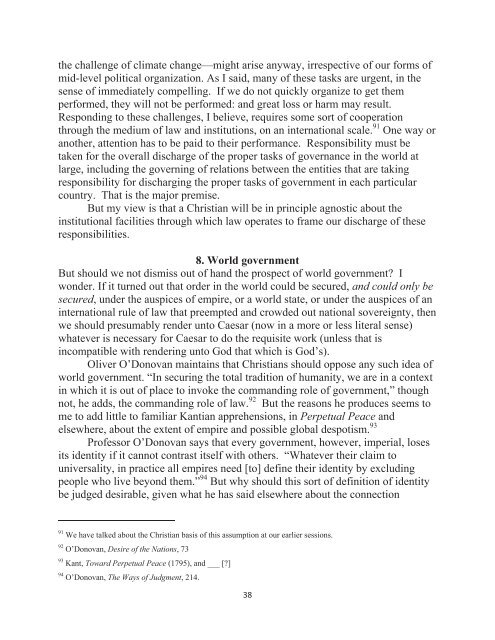International Legal Evangelism: Intelligence, Reconnaissance & Missions
International Legal Evangelism: Intelligence, Reconnaissance & Missions
International Legal Evangelism: Intelligence, Reconnaissance & Missions
You also want an ePaper? Increase the reach of your titles
YUMPU automatically turns print PDFs into web optimized ePapers that Google loves.
the challenge of climate change—might arise anyway, irrespective of our forms of<br />
mid-level political organization. As I said, many of these tasks are urgent, in the<br />
sense of immediately compelling. If we do not quickly organize to get them<br />
performed, they will not be performed: and great loss or harm may result.<br />
Responding to these challenges, I believe, requires some sort of cooperation<br />
through the medium of law and institutions, on an international scale. 91 One way or<br />
another, attention has to be paid to their performance. Responsibility must be<br />
taken for the overall discharge of the proper tasks of governance in the world at<br />
large, including the governing of relations between the entities that are taking<br />
responsibility for discharging the proper tasks of government in each particular<br />
country. That is the major premise.<br />
But my view is that a Christian will be in principle agnostic about the<br />
institutional facilities through which law operates to frame our discharge of these<br />
responsibilities.<br />
8. World government<br />
But should we not dismiss out of hand the prospect of world government? I<br />
wonder. If it turned out that order in the world could be secured, and could only be<br />
secured, under the auspices of empire, or a world state, or under the auspices of an<br />
international rule of law that preempted and crowded out national sovereignty, then<br />
we should presumably render unto Caesar (now in a more or less literal sense)<br />
whatever is necessary for Caesar to do the requisite work (unless that is<br />
incompatible with rendering unto God that which is God’s).<br />
Oliver O’Donovan maintains that Christians should oppose any such idea of<br />
world government. “In securing the total tradition of humanity, we are in a context<br />
in which it is out of place to invoke the commanding role of government,” though<br />
not, he adds, the commanding role of law. 92 But the reasons he produces seems to<br />
me to add little to familiar Kantian apprehensions, in Perpetual Peace and<br />
elsewhere, about the extent of empire and possible global despotism. 93<br />
Professor O’Donovan says that every government, however, imperial, loses<br />
its identity if it cannot contrast itself with others. “Whatever their claim to<br />
universality, in practice all empires need [to] define their identity by excluding<br />
people who live beyond them.” 94 But why should this sort of definition of identity<br />
be judged desirable, given what he has said elsewhere about the connection<br />
<br />
91 We have talked about the Christian basis of this assumption at our earlier sessions.<br />
92 O’Donovan, Desire of the Nations, 73<br />
93 Kant, Toward Perpetual Peace (1795), and ___ [?]<br />
94 O’Donovan, The Ways of Judgment, 214.<br />
<br />
38

















